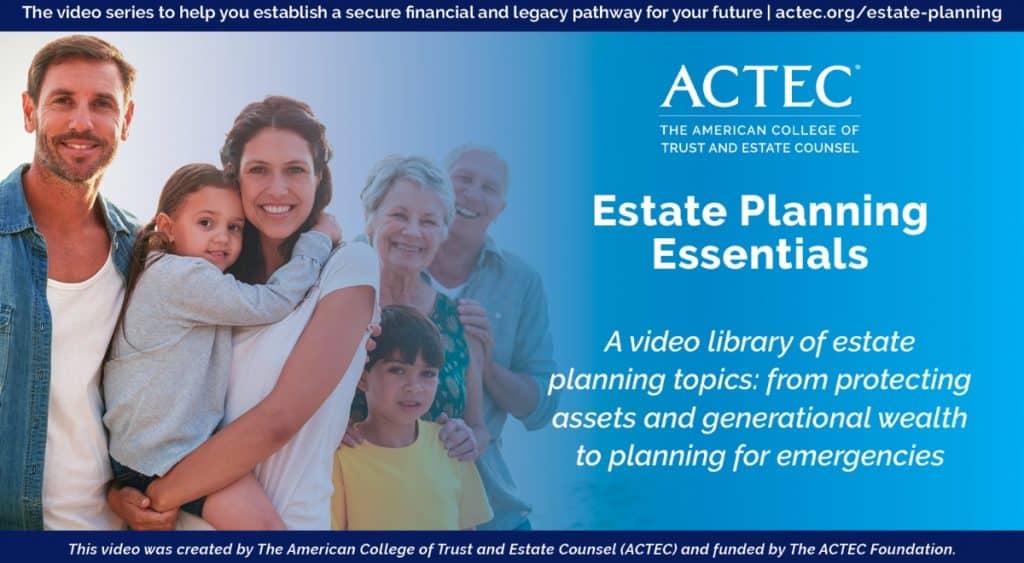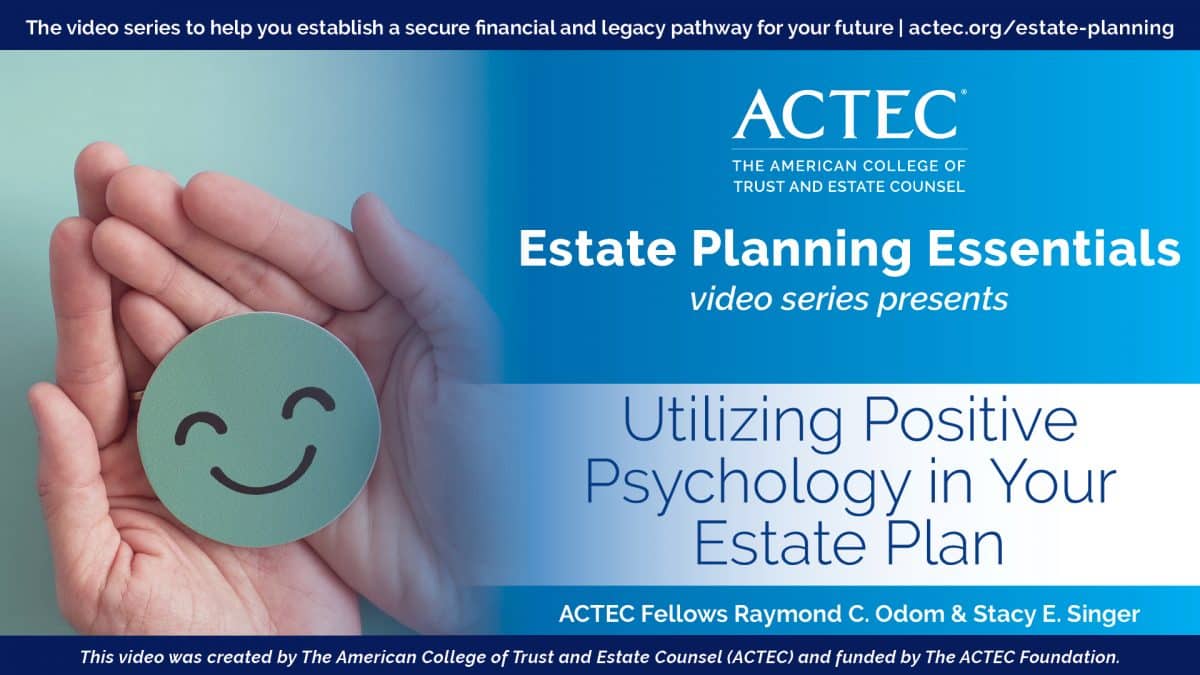An incentive trust is an estate planning tool that includes specific conditions or incentives for the beneficiaries to receive distributions. These conditions often encourage desirable behaviors or achievements, such as education, employment, or sobriety, before the trust assets are distributed.
ACTEC Fellows Tami Conetta and Thomas E. Simmons discuss how an incentive trust works, examples of incentives, and what to keep in mind when creating a family incentive trust.
Transcript
I’m Tami Conetta. I’m an ACTEC Fellow from Sarasota, Florida.
And I’m Tom Simmons. I’m an Academic ACTEC Fellow from Vermillion, South Dakota.
How Much to Leave to Heirs in a Trust
Tami Conetta: Tom, thanks for joining us today. I talk to a lot of clients who express some concern about how much is too much to give to their children and grandchildren and what can they do to address that? Because they do want them to be comfortable and they want them to be productive members of society and they don’t want them to be those spoiled trust fund babies. So, can we do that with our estate planning?
Tom Simmons: We certainly can, and the primary vehicle that we use to address those kinds of concerns is a trust. We can create a trust that will preserve, maintain and reinvest wealth over time and distribute it to the beneficiaries according to the terms of the trust.
Incentive Trust
Tami Conetta: Great. So I’ve heard something, too called an incentive trust. Can you tell me how that differs from the one you’re talking about?
Tom Simmons: Sure. So an incentive trust is one that has built within the trust instrument a series or one or more events or benchmarks that trigger the trustee to make greater or fewer trust distributions when a particular conduct or behavior of a beneficiary can be observed.
Tami Conetta: Okay. So if I do good things, I get more money, and if I don’t do good things, I get less money?
Tom Simmons: That’s exactly right.
Tami Conetta: Sounds a little bit like bribery to me.
Tom Simmons: It is a little bit like bribery, but hopefully, it’s conducted in a way that’s actually helpful to identify, for the beneficiaries, particular conduct that the settlor, that the client, would like to see and reward.
Tami Conetta: Interesting. Can you give us some examples of behaviors that you’ve seen in documents?
Tom Simmons: A common one is one that rewards grades. So, the trustee can be given a copy of the beneficiary’s grades from college or high school and give greater or less distributions depending upon the grades that the beneficiary obtained.
Tami Conetta: What about situations where I’m worried about, maybe, my child’s spouse? Any good examples of that?
Tom Simmons: Well, there are difficult ways of dealing with that. One of the ways is to address the provisions that extend a trust, for example, if the beneficiary is contemplating a divorce or something of that nature.
Tami Conetta: So really, it would protect the beneficiary and the trust itself?
Tom Simmons: That’s the idea, is helping the beneficiary preserve wealth.
Tami Conetta: So, do you think that these previsions actually work?
Tom Simmons: They certainly can, and in some cases they don’t. We can certainly see beneficiaries who identify the fact that they’ll get a greater distribution if they get straight As, and that helps motivate them to study. One of the more difficult things to deter with a trust instrument, but it’s still important, is substance abuse.
Tami Conetta: I can see where that would be difficult for the trustee to know when that’s happening and how to correct it with the distributions.
Tom Simmons: That’s right. As an individual, you can respond to those events and make your own best judgments, but when we’re creating a trust vehicle, we need to be very specific about what would trigger the trustees to either make or withhold a distribution.
Tami Conetta: So, in your mind, are there any downsides? It sounds like a great idea, and you know, if you do this, I’m going to give you some extra money but there have to be downsides. There are downsides to everything.
Tom Simmons: There certainly are — even with, for example, grades. We don’t necessarily want to penalize a beneficiary who has a learning disability. We’d actually want to encourage them to get maybe Bs instead of As, and so having the foresight to identify all those different particular circumstances is very difficult.
How to Adress Unequal Distributions of a Trust
Tami Conetta: I know a major concern of clients is a beneficiary who is doing good things — like they are a teacher, but they’re not being compensated as much as, perhaps maybe, a sibling who might be in the stock market. Is that something we can also address with these?
Tom Simmons: Yes, and that’s again another concern. One of the provisions I’ve seen repeatedly in an incentive trust is one that says, for example, to match or distribute a portion of what the beneficiary earned that last year. So, if they earn a lot of money, they’ll get more money. This has a nice way of rewarding productivity, but it doesn’t necessarily take account of someone who takes a lower-paying job to do really good things in a community.
Tami Conetta: What about trust provisions that put a cap on distributions so that we’re not giving them so much that they aren’t working or doing good things?
Tom Simmons: That’s exactly right, too. I think it was Warren Buffett who said something like, “Leave your children enough so that they can do anything but not so much that they won’t do anything.” And that’s also something that really comes down to the individual client and their dynamics and their family values.
Tami Conetta: Great. Well, I think it sounds like there’s a lot of flexibility for families to design around their particular circumstances and they probably need to talk to their lawyer about all the different options that are available.
Tom Simmons: Yes, an enormous amount of flexibility.
Tami Conetta: Yes. Well, thank you so much for your perspective today, Tom.
Tom Simmons: Thank you, Tami.
Featured Video
Utilizing Positive Psychology in Your Estate Plan
Learn the role of positive psychology and communication when creating your estate plan and leaving assets to family and beneficiaries.
ACTEC Estate Planning Essentials

ACTEC Fellows provide answers to frequently asked trust and estate planning questions in this video series.



